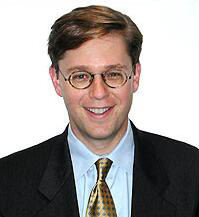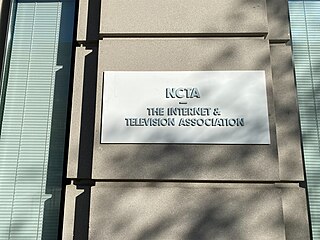
The Federal Communications Commission (FCC) is an independent agency of the United States government that regulates communications by radio, television, wire, satellite, and cable across the United States. The FCC maintains jurisdiction over the areas of broadband access, fair competition, radio frequency use, media responsibility, public safety, and homeland security.

Reed Eric Hundt is the chairman, CEO and co-founder of the Coalition for Green Capital. The idea of a national green bank came from work Hundt did for the Obama Presidential Transition Team in 2008-9, on which he was responsible for reviewing economic agencies of the federal government. The first champions of this new institution were then Congressmen Chris Van Hollen (D-Md) and Edward J. Markey (D-Mass). Legislation launching the national green bank was incorporated in ACES, the cap-and-trade bill enacted in the House, and also was passed on a bipartisan basis from the Senate Energy and Natural Resources Committee. A national climate bank bill was introduced by the same two Congressmen in 2019, after they had become senators; was passed in the House in 2020 and 2021; became part of the Inflation Reduction Act enacted in August 2022. During these years CGC created more than three dozen state and local green banks to lay the groundwork for the national entity.

Kevin Jeffrey Martin is a lobbyist for Facebook and former member and Chairman of the U.S. Federal Communications Commission (FCC), an independent agency of the United States government. He was nominated to be a commissioner by President George W. Bush on April 30, 2001, and was confirmed on May 25, 2001. On March 16, 2005, President Bush designated him as FCC chairman, to replace Michael K. Powell. President Bush renominated Martin to a new five-year term on the Commission on April 25, 2006, and he was reconfirmed by the U.S. Senate on November 17, 2006. In January 2009, Martin announced that he would step down from the FCC and join the Aspen Institute, as a senior fellow in the think tank's Communications and Society Program. He since became a partner with the law firm Squire Patton Boggs LLP, and was hired as Facebook's head of U.S. Public Policy.

William Earl Kennard is an American attorney and former government official. Kennard served as chairman of the Federal Communications Commission (FCC) from 1997 to 2001 under President Bill Clinton, and was the first African American to lead the agency. In 2009, Kennard was appointed by President Barack Obama to serve as Ambassador to the European Union, serving until 2013.

NCTA – The Internet & Television Association, formerly known as the National Cable & Telecommunications Association (NCTA), is a prominent trade association representing the American broadband and pay television industries. As of 2011, the NCTA encompassed more than 90% of the U.S. cable market, over 200 cable networks, and various equipment suppliers and service providers to the cable industry.

Jonathan Steven Adelstein is an American political appointee and trade association president. He was nominated to posts by Republican President George W. Bush and Democratic President Barack Obama, serving as a Commissioner of the Federal Communications Commission (FCC) and Administrator of the United States Department of Agriculture (USDA) Rural Utilities Service.
The Universal Service Fund (USF) is a system of telecommunications subsidies and fees managed by the United States Federal Communications Commission (FCC) intended to promote universal access to telecommunications services in the United States. The FCC established the fund in 1997 in compliance with the Telecommunications Act of 1996. The FCC is a government agency that implements and enforces telecommunications regulations across the U.S. and its territories. The Universal Service Fund's budget ranges from $5–8 billion per year depending on the needs of the telecommunications providers. These needs include the cost to maintain the hardware needed for their services and the services themselves. The total 2019 proposed budget for the USF was $8.4 billion. The budget is revised quarterly allowing the service providers to accurately estimate their costs. As of 2019, roughly 60% of the USF budget was put towards “high-cost” areas, 19% went to libraries and schools, 13% was for low income areas, and 8% was for rural health care. In 2019 the rate for the USF budget was 24.4% of a telecom company's interstate and international end-user revenues.

The Internet in the United States grew out of the ARPANET, a network sponsored by the Advanced Research Projects Agency of the U.S. Department of Defense during the 1960s. The Internet in the United States in turn provided the foundation for the worldwide Internet of today.
Public Knowledge is a non-profit Washington, D.C.–based public interest group. Founded in 2001 by David Bollier, Gigi Sohn, and Laurie Racine, Public Knowledge is primarily involved in the fields of intellectual property law, competition and choice in the digital marketplace, and an open standards/end-to-end internet.

Julius Genachowski is an American lawyer and businessman. He became the Federal Communications Commission Chairman on June 29, 2009. On March 22, 2013, he announced he would be leaving the FCC in the coming weeks. On January 6, 2014, it was announced that Genachowski had joined The Carlyle Group.
The National Association of Telecommunications Officers and Advisors (NATOA) is a US-based professional membership association that provides support to members on the many local, state, and federal communications laws, administrative rulings, judicial decisions, and technology issues impacting the interests of local governments. Founded in 1980, NATOA offers a wide range of advocacy services to individual and agency members representing cities, towns, counties and commissions across the country. NATOA has a headquarters office in Alexandria, VA, and is served by a twelve-member volunteer board of directors composed of members from across the country.

Susan P. Crawford is the John A. Reilly Clinical Professor of Law at Harvard Law School. She served as President Barack Obama's Special Assistant for Science, Technology, and Innovation Policy (2009) and is a columnist for WIRED. She is a former Board Member of ICANN, the founder of OneWebDay, and a legal scholar. Her research focuses on telecommunications and information law.
The Knight Commission on the Information Needs of Communities in a Democracy is a group of 17 American media, policy and community leaders formed to assess the information needs of communities in the United States in the 21st century, and recommend measures to help Americans better meet those needs. The John S. and James L. Knight Foundation funded the Commission and commissioned the Aspen Institute Communications and Society Program to run it. The co-chairs of the Knight Commission on the Information Needs of Communities in a Democracy are Theodore B. Olson, American lawyer and former Solicitor General of the United States, and Marissa Mayer, Vice President of Search Product and User Experience at Google. The Commission held its first public meeting in Washington, D.C., on June 24, 2008, and subsequent meetings or community forums in Aspen, Colorado; Chicago, Illinois; Missoula, Montana; Mountain View, California; Philadelphia, Pennsylvania; and Washington, D.C. The Knight Commission released its report, Informing Communities: Sustaining Democracy in the Digital Age on October 2, 2009.
Connecting America: The National Broadband Plan is a Federal Communications Commission (FCC) plan to improve Internet access in the United States. The FCC was directed to create the plan by the American Recovery and Reinvestment Act of 2009, and unveiled its plan on March 16, 2010.
Colin Crowell is an American policy expert active the telecommunications and Internet sector. He is currently the head of the Crowell Group. Crowell is the former Vice President of Global Public Policy and Philanthropy at Twitter, where he was the company's first public policy hire. Crowell was initially brought on board to build out this function globally for Twitter.
Broadband universal service, also known as "universal service obligation" (USO) or "universal broadband service", refers to government efforts to ensure all citizens have access to the internet. Universal voice service obligations have been expanded to include broadband service obligations in Switzerland, Finland, Spain and the UK.
Robert M. Pepper is an American specialist in communications policy.

Jessica Rosenworcel is an American attorney serving as a member and chairwoman of the Federal Communications Commission (FCC). She originally served on the FCC from May 11, 2012, to January 3, 2017, and was confirmed by the Senate for an additional term on August 3, 2017. She was named to serve as acting chairwoman in January 2021 and designated permanent chairwoman in October 2021. She was confirmed for another term by the Senate in December 2021. Rosenworcel's current term runs for five years beginning July 1, 2020.

Thomas Edgar Wheeler is an American businessman and former government official. A member of the Democratic Party, he served as the 31st Chairman of the Federal Communications Commission.
The Wireless Infrastructure Association (WIA), formerly known as PCIA, is an American trade association for wireless providers and companies that build cell phone towers, rooftop wireless sites, and other facilities that transmit wireless communication signals. The Washington Post described the industry as "the people who build all those cell towers so you can actually make those calls, download that data." These technologies are collectively referred to as "wireless telecommunications infrastructure."











